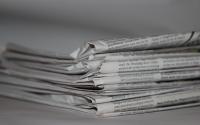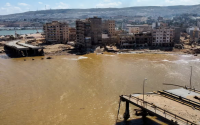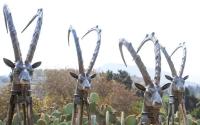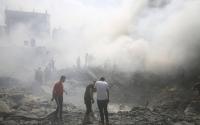18 December 2003The Independent
The thump of air pressure on the window wakes me up, a blast of sound that gently shakes the walls; the sound of 17 lives disappearing. Bombs in Baghdad are a daily heartbeat, the aftermath a kind of obscene theatre.
I reach the crossroads minutes later. There's a shattered minibus with the pulverised remains of its passengers inside, a screaming fireman, pieces of a lorry - blown apart with such impact that the engine block is shorn in half - and two burning cars, the flames licking at their wheels and something terrible below the driver's seat. The bomb was in the truck. But the bus. Why would anyone bomb a busload of Iraqi civilians?
There is flesh on the road, and vast shards of iron and metal and sandals and women's handbags around the bus where several of the dead passengers - or what is left of them - are still sitting in their seats. Shrapnel has cascaded into the slums of Al-Bayaa, a pathetic warren of brick houses and sewage-filled laneways whose broken windows now sparkle in the streets
A group of US soldiers has just arrived, three of them prowling through the muck and the oil-splattered road for the bomb-detonator. Sergeant Joel Henshon of the 11th/65th US military police guards what might have been part of the mechanism, a grenade that glistens grey and sinister on the mud of a traffic island. There must be a thousand shouting people standing in the dawn of smoke and flames, men, 'kuffiaed' in Arab scarves, many of them in black leather jackets.
I find some cops by the burning cars, friendly, American-paid policemen with smart little yellow identification badges and pale blue uniforms. A brand-new fire engine arrives and a torrent of water swamps what's left of the truck and the bus. New Iraq, it seems, responds efficiently to its growing violence. A policeman - for this is the flip side of every constabulary in the world - walks up and, incredibly, asks me if I would like to know what he has discovered. A cop in Baghdad is a good guy. Is that what we are now to learn?
""The truck belonged to the Ministry of Oil, it was a tanker without a trailer, registration number 5002, and we found this in what was left of the cab."" He gives me a golden sticker with ""Allah"" written in Arabic on one side and ""Mohamed"" on the other. God and his Prophet withstood the blast. Nothing else did. A dozen men have clustered ghoulishly around the nearest car. There is a mass of glistening bones beneath the blackened steering shaft; femurs and bits of backbone.
The Mercedes minibus had come from the province of Dyala, east of Baghdad. My friendly, balding cop proves this from the registration plate - ""Number 9530,"" he reads from his notebook - 10 men and women and a driver who must have woken before dawn for a routine journey to the capital. The cop has already discovered the owner of the bus - a man called Nadji - and the identity of the driver, an Iraqi named Amad Jabr. Amid the anarchy of Iraq, a policeman is doing his job.
But surely the bomber was en route to another target. Premature explosion. Was there a police station near here? Sergeant Henshon gives a Baghdad reply. ""There was,"" he says with a beautiful Alabama twang in this grim dawn. ""But it has already been bombed."" Then a shopkeeper says he saw an American convoy driving down the road and the truck trying to catch up with it, colliding with one of the cars beside the minibus.
Was this the target? Baghdad does not easily produce replies to such questions. We still do not know how many Iraqis died this week under American gunfire in the Sunni cities around Baghdad as they protested against the capture of Saddam Hussein. I drive through the grey wastes of desert to Fallujah, going carefully through my notebook, adding up the lists of deaths from local hospitals. In all, I count 40 dead since Saddam's capture. The Americans say the men they shot are all ""insurgents"" - they always do - and the tally includes 10 or 11 dead in Ramadi, another 11 in Samarra, up to nine in Khaldiyah and four in Fallujah.
The Americans said they were attacked in Fallujah and a local police captain agrees. ""The resistance opened fire on an American vehicle that was set on fire,"" Captain Taha al-Fallahi tells me. ""The Americans fired back at the crowds, killed four - one of them a child - and wounded many others."" At the hospital, I find a small boy being helped into his father's car.
Fourteen-year-old Ra'ad Rabiah al-Joubouri had been in the market buying groceries for his mother when the Americans began firing down the road. He is sitting now in the back of the car next to his black-cowled mother, his right, bandaged leg stretched out on to the arm rest of the driver's seat. ""I had my bicycle and I wanted to cross the square and I saw the Americans,"" he says. ""Then I felt the bullet hit my leg and it felt wet and hurt."" He gives me a grin and his father says he is a brave boy. Another ""insurgent"" who almost bit the dust."






